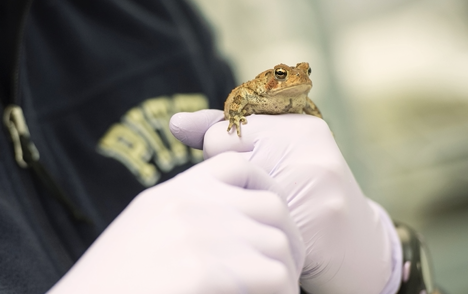
Photo courtesy of the University of Pittsburgh.
Can frogs’ ability to survive certain infections help enhance understanding of how to help humans do the same? A new research partnership funded by the National Science Foundation will examine resilience demonstrated by amphibians and other groups of species to emergence and spread of new infectious diseases, along with other human-caused changes to the global ecosystem. The team will investigate what has allowed amphibians to bounce back after disease outbreaks, using this group of species as a model for understanding how resilience comes about in other living systems.
These questions will be the focus of RIBBiTR, the Resilience Institute Bridging Biological Training and Research, a new center at the University of Pittsburgh funded by a five-year, $12.5 million grant from the National Science Foundation. Professor Erica Bree Rosenblum is one of several lead investigators on the project.
Rosenblum and the collaborating scientists have been conducting a range of research papers for years, most recently one published in a Royal Society journal in June titled “Divergent regional evolutionary histories of a devastating global amphibian pathogen.”
Corinne Richards-Zawacki, professor in ecology and evolutionary biology at University of Pittsburgh, will lead the work as Principal Investigator.
“Because we have lots of data over time from around the world on amphibians who are doing better now than they were after the initial disease outbreaks, they are perfect for studying resilience,” Richards-Zawacki said. “We can ask many questions: What mechanisms make them able to live with their pathogens? Are the pathogens changing? What is the impact of different environments? If we understand how the relationship has changed between the species and the threat, we can consider how resilience can be applied to other biological systems.”
The institute is part of the NSF’s strategy to create large research teams across disciplines and regions to investigate “rules of life” principles—fundamental life processes ranging from biomes to the Earth. This initiative aims to focus on resilience as one such “rule,” applying what they learn about the amphibians’ recovery from a newly emerged fungal to understand how other living systems can bounce back from global change stressors. The study subjects will be amphibians from sites in Brazil, Panama, the Sierra Nevada of California, and Pitt’s Pymatuning Lab of Ecology in northwest Pennsylvania.
Read the full press release at the University of Pittsburgh website.
